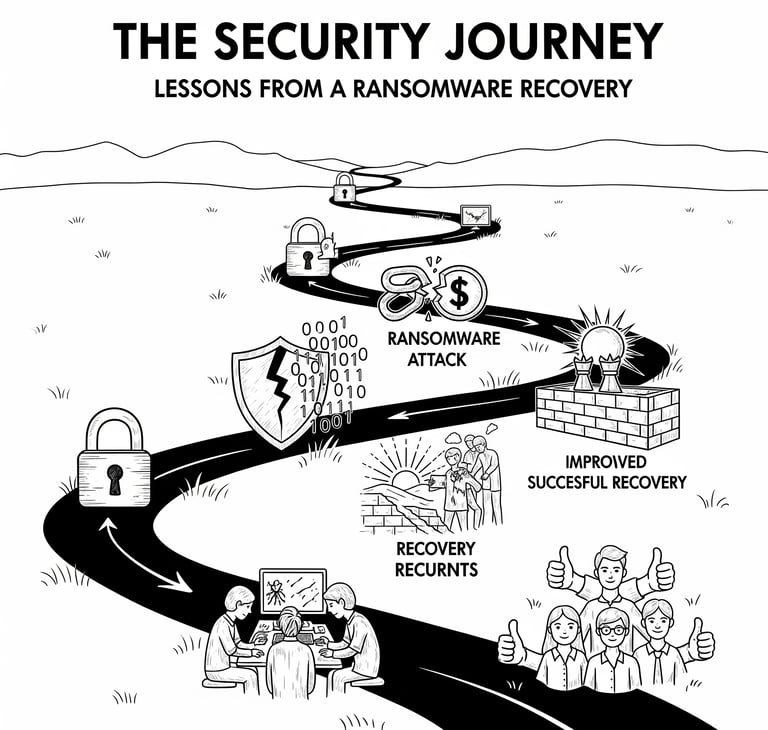The Security Journey - Lessons from a Ransomware Recovery
The Security Journey
Rahul Singh
6/2/2025


Introduction
Ransomware attacks have become an unfortunate reality for businesses of all sizes, with small and medium-sized enterprises (SMEs) increasingly targeted due to perceived weaker defenses. One After Hours GP firm harrowing experience with a ransomware attack offers valuable lessons for other small businesses about prevention, response, and building a more secure future.
The Story: An After Hours GP Firm's Ransomware Recovery
ABC After Hours GP firm (name changed for privacy) became victim to a sophisticated ransomware attack that encrypted critical client files and disabled their practice management system. Here's what happened next:
Discovery: The firm noticed slow performance on Monday morning. By midday, they realized file extensions had been changed and systems were locked with a demand for cryptocurrency payment.
Immediate Response:
Disconnected affected machines from the network
Contacted their IT support provider (who unfortunately didn't have comprehensive backup procedures in place)
Began notifying clients about potential data breaches
The Aftermath:
Client trust was severely damaged, with some high-profile cases threatening to leave
They spent a handsome amount on emergency IT services and legal fees related to the incident
Productivity ground to a halt for nearly two weeks while they rebuilt systems from scratch
Key Lessons for Small Businesses
You Are a Target
43% of cyber attacks target small businesses (Verizon DBIR)
Attackers know SMEs often have fewer resources to invest in security
You don't need to be a high-profile company to be targeted
Prevention is Better Than Cure The firm's lack of proper backups and network segmentation turned what might have been a minor incident into a major crisis.
Security Requires Investment While no solution guarantees 100% protection, basic measures could have mitigated the damage:
Regular, tested backups
Network segmentation to limit attack spread
Employee security training
Up-to-date endpoint protection
Building a Stronger Security Posture
Essential Security Layers
Firewall with intrusion prevention system (IPS)
Endpoint protection with behavior-based detection
Regular software updates and patch management
Multi-factor authentication for all critical systems
Secure backup solutions with air gap capabilities
Employee Training Programs
Conduct regular security awareness training
Run phishing simulation exercises quarterly
Create clear policies around password management and data handling
Incident Response Plan
Define roles and responsibilities for different scenarios
Document communication protocols with stakeholders (employees, clients, regulators)
Establish relationships with legal and PR experts beforehand
Continuous Monitoring
Implement SIEM (Security Information and Event Management) solutions if budget allows
Regular vulnerability scanning and penetration testing
Log analysis to detect anomalies early
Why Security Can Be a Competitive Advantage
Customer Trust: Demonstrating strong security practices can differentiate your business in crowded markets.
Business Continuity: Companies with robust security measures experience shorter downtimes after incidents.
Insurance Premiums: Better security posture often leads to lower cyber insurance costs.
Compliance Advantage: Proactive security implementation helps meet regulatory requirements for industries like healthcare and finance.
Where to Start
Conduct a basic security assessment (many SME-focused IT providers offer free assessments)
Implement "low-hanging fruit" fixes first (backups, MFA, endpoint protection)
Create an annual security improvement plan with measurable goals
Consider cyber insurance as part of your risk management strategy
Conclusion
The ABC firm's story serves as a stark reminder that no business is immune from cyber threats—and reactive approaches often prove far more costly than proactive investments in security.
9 Auras Tech
Innovative IT Solutions For A Brighter Future
Contact
info@9aurastech.com
+61 0470242024
9aurastech © 2025. All rights reserved.
